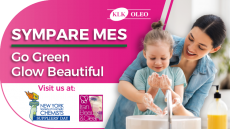Crowd support: Social commerce crucial for brands to overcome recessionary behaviours in pandemic economy

Sasha Tan, CEO of beauty social commerce platform Favful, told CosmeticsDesign-Asia that she has observed this trend growing for the past few years.
“In recent years, we have seen a more informed and connected consumer that is growing increasingly sceptical of brands. As they develop recessionary behaviours because of COVID-19, they will want to spend less. And when they do spend, they will spend smarter,” said Tan.
As such, consumers are more likely to turn to independent sources for product information and recommendations, such as their fellow consumers.
“With scepticism prevailing among beauty product consumers, brands must find ways to increase customer trust by engaging with consumer communities and acknowledging their feedback.”
Since its launch in 2016, Favful has accumulated a network of around 4,000 social media influencers and 52,000 beauty consumers that contribute content to the site.
“As a consumer-driven community, we do not position ourselves with bias towards any of the brands. We also tell the brands we work with that we do not control what the consumers say. Basically, there’s no brief. As such, we are seen as more trustworthy and transparent to consumers.”
With this network along with machine learning technology, Favful is able to influence purchase decisions, seeing a 20% add-to-cart rate from our community-generated content.
A community-driven approach is more effective then influencer marketing, which is becoming more limited, said Tan.
“Brands think influencers bring them straight down to the last marketing funnel of conversion but it’s really at the top awareness level. In the past, an influencer might be able to get you high conversion, but now that consumers understand that this is their job and a form of advertising, the conversion rate has certainly dropped.”
Community-driven campaigns
The firm has assisted more than 60 brands like Bio-essence, Eucerin in community activation campaigns.
Previously, it worked with Nivea to launch a new product in the mousse category that has been dominated by other players in the market in the past year.
Favful activated 135 influencers and organised a community contest to help Nivea closed the gap with other brands and became the number one product in the mousse category in three months.
The campaign raised 17 million impressions, an 8% engagement rate with 1.36 million social actions taken.
“We are seeing that as influencer marketing has quickly turned into a crucial part of brands' digital engagement strategy, it contributes great brand awareness overactive brand engagements or conversion to revenue. There's where we top it up with social commerce as a third-party enabler channel to close the engagement loop, openly encouraging dialogue, acknowledging suggestions and consumer sentiment,” said Tan.
The firm is also seeing more brands actively taking the lead in engaging consumers through education.
Most recently, the company teamed up with Bio-Oil to launch an education campaign for its first new product in 30 years.
“We can help them start a conversation among the community without dictating if it will be positive or negative. We just open the dialogue to give brands the chance to connect with the consumers without directly manipulating the conversation."
Moving forward, Tan believes the underlying trends and the pandemic will continue to drive brands to engage third-party platforms like Favful to openly encourage dialogue among them and consumers.
“With the right direct-to-consumer strategies such as AI enabling, community intelligence, consumer input collection, Favful is able to deliver a higher conversion rate, lower acquisition cost, and provide valuable consumer prediction data. Taken together, third-party enablers will be able to help brands acclimate to the port-pandemic new normal defined by dramatically altered consumer habits.”









![Indus Valley is working to corner 30% of India's online premium boxed hair colour market. [Indus Valley]](/var/wrbm_gb_food_pharma/storage/images/_aliases/wrbm_tiny/publications/cosmetics/cosmeticsdesign-asia.com/article/2024/07/26/indus-valley-aims-to-secure-30-of-india-s-online-premium-hair-colour-market-with-organic-offerings/17594932-5-eng-GB/Indus-Valley-aims-to-secure-30-of-India-s-online-premium-hair-colour-market-with-organic-offerings.jpg)
![[Getty Images]](/var/wrbm_gb_food_pharma/storage/images/_aliases/wrbm_tiny/publications/cosmetics/cosmeticsdesign-asia.com/china/china-focus-latest-developments-in-china-s-booming-beauty-market25/17606695-1-eng-GB/China-focus-Latest-developments-in-China-s-booming-beauty-market.jpg)
![Kosé has launched makeup brand Visée in Singapore as part of plans to reinforce its position in SEA. [Visée]](/var/wrbm_gb_food_pharma/storage/images/_aliases/wrbm_tiny/publications/cosmetics/cosmeticsdesign-asia.com/headlines/business-financial/visee-singapore-kose-aims-to-enhance-brand-visibility-in-sea-with-new-launch/17587264-1-eng-GB/Visee-Singapore-Kose-aims-to-enhance-brand-visibility-in-SEA-with-new-launch.jpg)
![ble C&C is set on reinforcing its competitiveness in China’s beauty market. [Missha]](/var/wrbm_gb_food_pharma/storage/images/_aliases/wrbm_tiny/publications/cosmetics/cosmeticsdesign-asia.com/headlines/business-financial/able-c-c-aims-to-strengthen-competitiveness-in-china-through-online-expansion-kol-collabs/17591626-1-eng-GB/Able-C-C-aims-to-strengthen-competitiveness-in-China-through-online-expansion-KOL-collabs.jpg)

![LG H&H genetic study says 23 genetic regions affect natural skin tone. [Getty Images]](/var/wrbm_gb_food_pharma/storage/images/_aliases/wrbm_tiny/publications/cosmetics/cosmeticsdesign-asia.com/article/2024/07/23/lg-h-h-discovery-of-genetic-skin-tone-factors-in-east-asians-potentially-key-to-skin-radiance-developments/17587210-1-eng-GB/LG-H-H-discovery-of-genetic-skin-tone-factors-in-East-Asians-potentially-key-to-skin-radiance-developments.jpg)

![DR.CI:LABO expects brand-supplier partnerships gain more public prominence as consumers interest in skin care grows online. [Dr.Ci:Labo]](/var/wrbm_gb_food_pharma/storage/images/_aliases/wrbm_tiny/publications/cosmetics/cosmeticsdesign-asia.com/article/2024/07/22/brand-supplier-partnerships-will-come-to-the-fore-amid-the-online-skin-care-landscape-dr.ci-labo/17576755-1-eng-GB/Brand-supplier-partnerships-will-come-to-the-fore-amid-the-online-skin-care-landscape-DR.CI-LABO.png)


